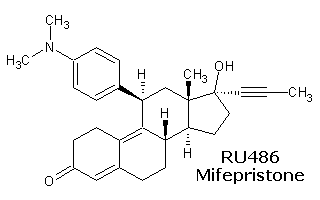
An issue I have written about for the Nature drug discovery site is the re-marketing of pharmaceutical products for uses other than the original one for which a drug was developed. The latest example is the emergence of the so-called “morning after” pill RU486 as a rapid-acting antidepressant (it has already found use in treating certain cancers and psychotic depression).
RU486, mifepristone, is a steroidal hormone similar in chemical structure to progesterone. It inhibits the progesterone receptor and so is termed an ‘antiprogestin’, its effect is to induce abortion.
This week New Scientist reports on how RU486 might work as an antidepressant:
“The hormone treatment is based on earlier findings that stress plays a major part in triggering and prolonging depression. Stress hormones appear to damage a part of the brain called the hippocampus. The region is susceptible because it is particularly rich in hormone receptors, allowing it to regulate ongoing hormone release,” the magazine says.